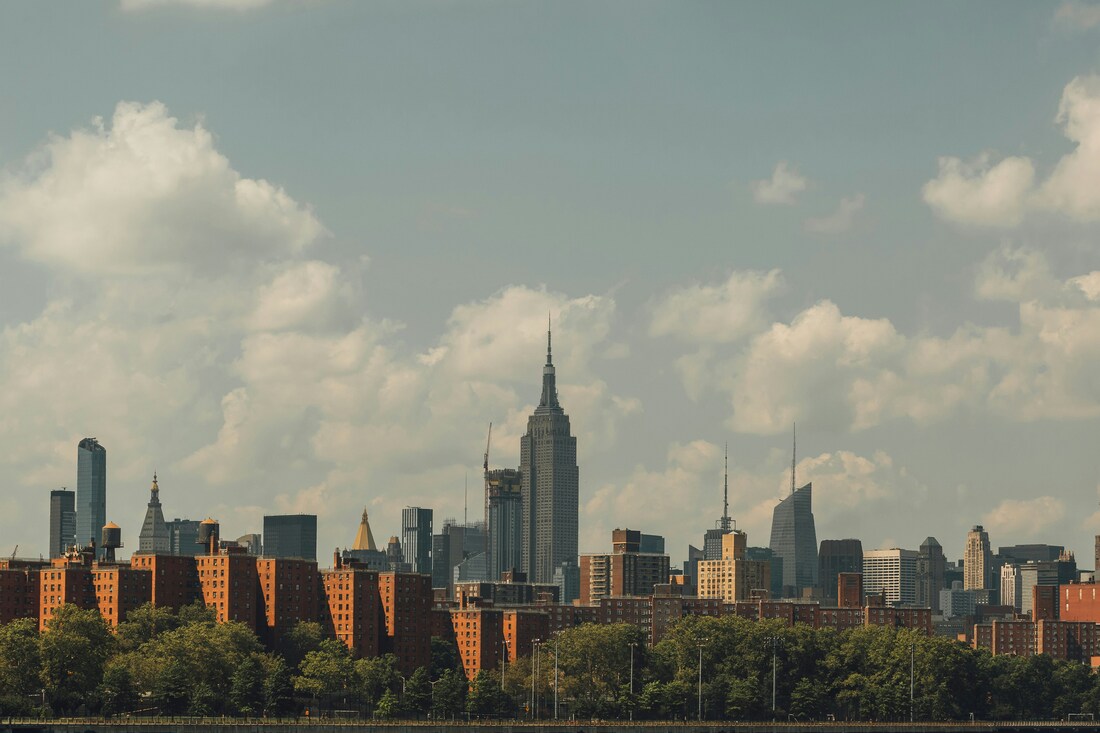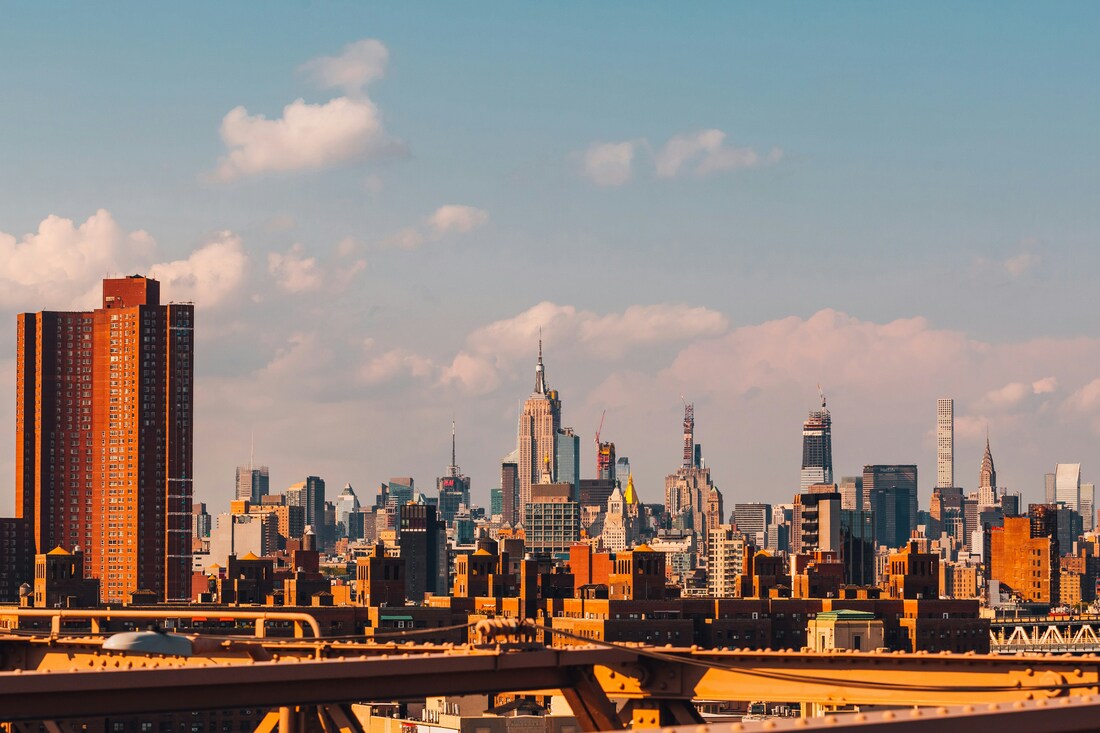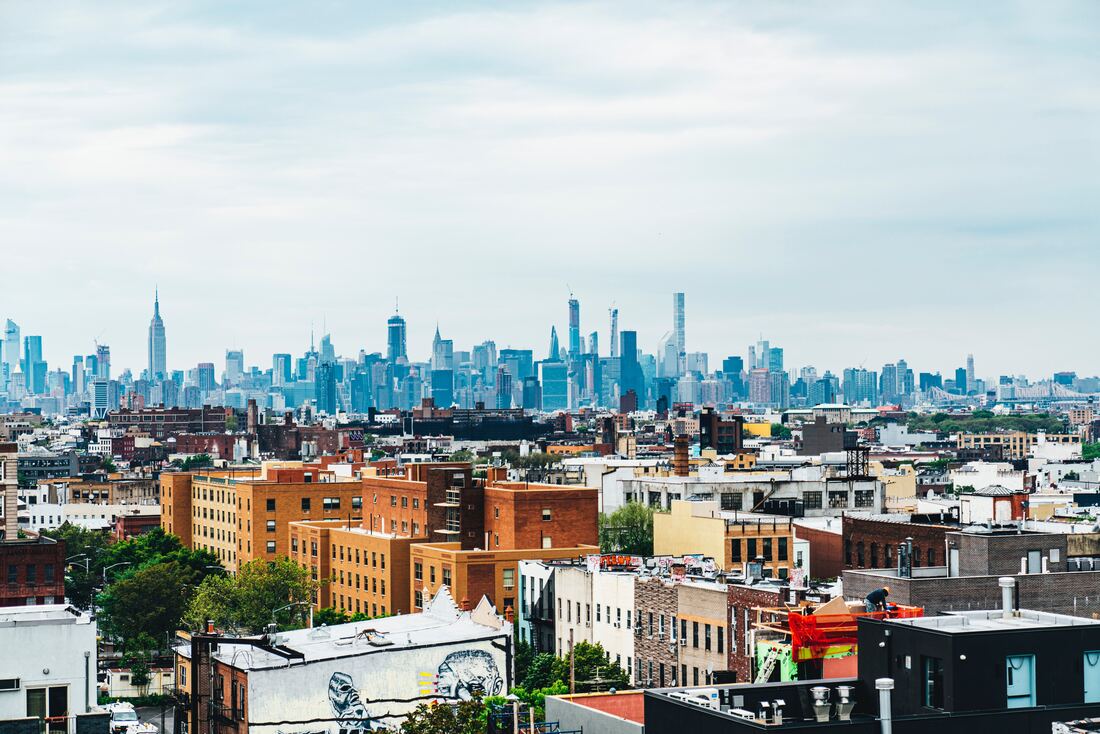|
🏙️ Ready to Make NYC Your Home? Let Colin O'Leary and The Big City Team Be Your Guide! 🏙️ Are you dreaming of calling New York City your home sweet home? Look no further! Colin O'Leary and The Big City Team are here to navigate you through the exciting journey of finding your perfect apartment in the city that never sleeps! 🌃 From the bustling streets of Manhattan to the vibrant neighborhoods of Brooklyn, we've got the expertise and dedication to help you find the ideal rental tailored to your lifestyle and preferences. With years of experience in New York City's real estate market, we understand the unique challenges and opportunities it presents, ensuring a smooth and stress-free apartment hunting experience for you. Why Choose Us? ✅ Personalized Service: We take the time to understand your needs and preferences to match you with the perfect neighborhood and apartment. ✅ Extensive Market Knowledge: With our finger on the pulse of NYC's real estate market, we'll guide you through every step of the rental process, from initial search to lease signing. ✅ Trusted Expertise: As part of Berkshire Hathaway HomeServices, a global leader in real estate, you can trust our team to deliver exceptional service and results. Get Started Today! Ready to take the plunge into the vibrant world of NYC living? Contact us at 646-300-2012 or email [email protected] to schedule your complimentary consultation. Whether you're a first-time renter or a seasoned New Yorker, The Big City Team is here to make your transition seamless and enjoyable. Join us on this exciting adventure and let's find your perfect place to call home in the Big Apple! 🍎🗽 🔗 ------------------------------------------------------ 📲 Let’s Connect! Follow The Big City Team on social media: Instagram ➡️ https://www.instagram.com/thebigcityteam/ LinkedIn ➡️ https://www.linkedin.com/company/thebigcityteam/ Facebook ➡️ https://www.facebook.com/TheBigCityTeam X (Twitter) ➡️ https://twitter.com/TheBigCityTeam
0 Comments
Find your haven in Apartment 3L, an inviting, spacious and serene space in the heart of Lenox Hill. The Bryn Mawr offers the full-service luxury you deserve, with a 24-hour doorman, on-site super, and full staff. Situated on the prime Upper East Side, the building boasts a stunning rooftop deck with an outdoor shower, an attached garage, a full laundry facility, bike storage, and a newly renovated fitness area complete with cardio equipment, weight machines, a yoga area, and saunas. Convenience abounds with easy access to N/Q/R/4/5/6F & Q trains, buses, and CitiBike stations. Apartment 3L Highlights: This tranquil haven, tucked away at the end of the hall for ultimate privacy, welcomes you with a foyer featuring a generous closet. The bright and sunny southwest-facing living room offers ample space for entertaining, while the windowed kitchen boasts a sturdy Sub-Zero refrigerator. The spacious bedroom is ideal for a king-size bed, a home office, and boasts ample closet space for all your needs. A deep linen closet provides extra storage, and hardwood floors flow throughout the apartment. Two controllable year-round AC units ensure year-round comfort. Building Policies: The Bryn Mawr allows for maximum financing of 80%. Sublets are allowed for one-year terms at a time, subject to Board approval. Co-purchasing, guarantor financing and gifting on a case-by-case basis are also permitted. Not Allowed: Parents buying for children, corporate purchases/leases, short-term rentals, and Airbnb hosting are not permitted. Don’t miss this opportunity to live in the Upper East Side’s vibrant neighborhood with a wealth of restaurants, shops, and transportation options! Call Jonathan Ettricks at 347-470-2272 to schedule a private showing. ------------------------------------------------------ 📲 Let’s Connect! Follow The Big City Team on social media: Instagram ➡️ https://www.instagram.com/thebigcityteam/ LinkedIn ➡️ https://www.linkedin.com/company/thebigcityteam/ Facebook ➡️ https://www.facebook.com/TheBigCityTeam X (Twitter) ➡️ https://twitter.com/TheBigCityTeam Leah Garcia invites you on a journey through time and space, delving into the rich tapestry of Downtown Brooklyn's history and modern allure. Imagine a quaint village on the tranquil western edge of Long Island, where life moved at a gentle pace and the air was filled with the scent of saltwater and the rustle of leaves. This was the humble beginning of Downtown Brooklyn, a place where simplicity reigned supreme. But as the years passed, change swept through the streets like a gust of wind, bringing with it the hustle and bustle of urban life. The once serene village transformed into a vibrant epicenter of activity, where towering skyscrapers rose to meet the sky and the sounds of traffic replaced the chirping of birds. Yet, amidst the chaos of progress, traces of history lingered like whispers in the wind. Cobblestone streets whispered tales of days gone by, while historic buildings stood as silent sentinels, bearing witness to the passage of time. Today, Downtown Brooklyn stands as a testament to the power of adaptation, seamlessly blending its historical roots with the vitality of modern life. Here, you'll find a melting pot of cultures and traditions, each adding their own unique flavor to the vibrant tapestry of the neighborhood. From the majestic Brooklyn Bridge to the iconic brownstone-lined streets, every corner of Downtown Brooklyn tells a story waiting to be discovered. Whether you're strolling through the leafy green parks or exploring the eclectic boutiques and eateries, there's always something new and exciting to uncover. And if you're considering making Downtown Brooklyn your home, there's no one better to guide you through the process than Leah Garcia. With her passion for real estate and intimate knowledge of the neighborhood, Leah can help you find the perfect place to call your own. So why wait? Take the leap and join Leah Garcia on a journey through the heart of Downtown Brooklyn. Contact her today at 929-571-5742 for a free consultation and start your own chapter in this storied neighborhood. ------------------------------------------------------ 📲 Let’s Connect! Follow The Big City Team on social media: Instagram ➡️ https://www.instagram.com/thebigcityteam/ LinkedIn ➡️ https://www.linkedin.com/company/thebigcityteam/ Facebook ➡️ https://www.facebook.com/TheBigCityTeam X (Twitter) ➡️ https://twitter.com/TheBigCityTeam  Photo by Benny Rotlevy on Unsplash Renting an apartment in the heart of the Big Apple can be a daunting task, but with the right knowledge and preparation, you can navigate the process smoothly, save money, and reduce stress. Here's a comprehensive guide to renting in New York City: 1. Understand the Costs Before diving into the rental market, it's crucial to grasp the financial obligations. New York City's rental market demands upfront costs that can catch newcomers off guard. Typically, renters should budget for the first month's rent, a security deposit equal to one month's rent, and a broker's fee, which often equals 15% of the total annual rent. For instance, securing a 1-bedroom apartment in Manhattan could tally up to $11,400 in initial fees alone. While some buildings may offer incentives like waived broker fees or free rent, these are exceptions rather than the norm. Being financially prepared is key to a successful apartment search. 2. Know Your Application Strengths Landlords in NYC typically scrutinize applicants' credit scores and income to assess their eligibility. A general rule of thumb is that tenants should earn at least 40 times the monthly rent. For example, for a $3,000 per month apartment, applicants should have an annual income of $120,000. If your income falls short, having a guarantor may be necessary. Guarantors are expected to earn at least 80 times the monthly rent, providing a safety net for landlords. Understanding these criteria beforehand streamlines the application process and increases your chances of securing your desired apartment. 3. Consider Location Carefully New York City's diverse neighborhoods offer something for everyone, but your choice should align with your budget and commuting needs. Factor in commute times and transportation options when selecting a neighborhood. Proximity to work or easy access to public transit can significantly enhance your quality of life. While living in the heart of the city may be appealing, it's essential to weigh the trade-offs between convenience and affordability. Balancing these factors ensures you find a neighborhood that suits your lifestyle and budget. 4. Leverage Expert Assistance Navigating NYC's rental market can be overwhelming, but enlisting the help of a seasoned rental agent can simplify the process. Experienced agents possess insider knowledge, access to premium listings, and negotiation skills that can work to your advantage. Whether you're a first-time renter or a seasoned New Yorker, partnering with a reputable agent can save you time, money, and stress. Conclusion: Renting an apartment in New York City requires careful planning and foresight, but armed with the right information and assistance, it can be a rewarding experience. By understanding the costs, assessing your application strengths, choosing the right location, and seeking expert guidance, you can navigate the rental market with confidence. If you're ready to embark on your apartment hunt or have questions about the process, don't hesitate to reach out to our team for a complimentary consultation at 646-300-2012. Welcome to the city that never sleeps—your new home awaits! ------------------------------------------------------ 📲 Let’s Connect! Follow The Big City Team on social media: Instagram ➡️ https://www.instagram.com/thebigcityteam/ LinkedIn ➡️ https://www.linkedin.com/company/thebigcityteam/ Facebook ➡️ https://www.facebook.com/TheBigCityTeam X (Twitter) ➡️ https://twitter.com/TheBigCityTeam  Photo by Emiliano Bar on Unsplash Closing costs for selling a home in New York City can vary based on factors such as the sale price of the property, the terms of the sale agreement, and specific requirements by lenders or local authorities. However, here are some common closing costs you might encounter: 1. Real Estate Commission: This is typically the largest cost and is paid to the real estate agents involved in the transaction. It is usually a percentage of the sale price, typically around 5-6% split between the seller's and buyer's agents. 2. Attorney Fees: Sellers often hire a real estate attorney to handle legal aspects of the sale, such as reviewing contracts and ensuring all necessary documents are in order. Attorney fees can vary but typically range from a few thousand dollars to more depending on the complexity of the transaction. 3. Transfer Taxes: In NYC, both the state and the city impose transfer taxes on real estate transactions. The transfer tax rate varies depending on the sale price of the property. The seller is typically responsible for paying the transfer taxes. 4. Title Insurance: Sellers often pay for title insurance to protect the buyer against any issues with the title of the property. The cost of title insurance can vary based on the sale price and the title insurance company. 5. Recording Fees: There are fees associated with recording the sale with the appropriate government office. These fees vary depending on the jurisdiction. 6. Miscellaneous Fees: There may be other miscellaneous fees, such as escrow fees, courier fees, and administrative fees, that the seller is responsible for paying. 7. Capital Gains Tax: Capital gains tax is another important consideration when selling a home, though it's not technically a closing cost. When you sell a home, any profit you make (the difference between the sale price and your adjusted basis, which typically includes what you originally paid for the property plus any improvements you've made) may be subject to state and federal capital gains taxes. Consulting with a tax professional or accountant familiar with New York City real estate transactions can help you understand your tax obligations and any available exemptions or deductions. It's important to note that these are just common closing costs and there may be additional expenses depending on the specific circumstances of the sale. It's advisable to consult with a real estate agent or attorney familiar with the NYC market to get a more accurate estimate of closing costs for your particular situation. If you have any questions about selling your home, reach out to our team at 646-300-2012 to schedule a free consultation. ------------------------------------------------------ 📲 Let’s Connect! Follow The Big City Team on social media: Instagram ➡️ https://www.instagram.com/thebigcityteam/ LinkedIn ➡️ https://www.linkedin.com/company/thebigcityteam/ Facebook ➡️ https://www.facebook.com/TheBigCityTeam X (Twitter) ➡️ https://twitter.com/TheBigCityTeam  Photo by Benny Rotlevy on Unsplash If you're in the market for a home in NYC, it's crucial to familiarize yourself with the nuances of the condo and co-op market before diving into the buying process. In contrast to many other regions, New York City predominantly features condos and co-ops, each presenting distinct advantages and disadvantages based on your lifestyle and goals. Investors often find condos to be the preferred choice, given their flexibility. Condos are well-suited for those planning to buy as an investment property. On the other hand, co-ops cater more to end-users due to their stringent rules and regulations. For instance, if your intention is to live in the purchased unit for a few years before renting it out, a condo might be more suitable. Co-ops, with their restrictive subletting policies, may necessitate selling if you need to relocate. Co-ops generally boast a higher owner-occupancy rate compared to condos, fostering a less transient community where you're more likely to know your neighbors. However, co-ops often have stricter subletting policies, while condos provide more flexibility, allowing you to rent to anyone for any duration. Additionally, co-op buildings tend to be less pet-friendly than condos. Condos are typically more expensive than co-ops due to a larger pool of potential buyers. Co-ops often require a higher down payment, typically around 20%, whereas condos may be purchased with as little as 10% down in certain situations. When it comes to resale, condos tend to be quicker and easier to sell than co-ops. Co-op sales involve a lengthier process due to the comprehensive co-op board application, which may include a "flip tax," an additional percentage of the sale price. The ownership structure also differs: buying a co-op is akin to purchasing stock in a corporation, with owners as shareholders. Co-ops often require buyers to use the property as a primary residence or pied-à-terre, while condos have no such restrictions. The application process is another differentiating factor. Co-op buildings typically have a more extensive and detailed application process, including an in-person or virtual interview with the co-op board. Condo applications are generally less intensive, as you're purchasing the physical space rather than shares in the building. Monthly fees are a common aspect of both condos and co-ops, covering building maintenance, salaries, utilities, and insurance. Co-op monthly fees include property taxes, while condo owners pay property taxes directly to the government. In conclusion, thorough research is crucial before embarking on your home search in NYC. Understanding the pros and cons of condos and co-ops will help you make an informed decision based on your unique situation. If you have any questions about buying or selling a co-op or condo in NYC, feel free to reach out to us at [email protected] or call us at 646-300-2012 to schedule a complimentary consultation. ------------------------------------------------------ 📲 Let’s Connect! Follow The Big City Team on social media: Instagram ➡️ https://www.instagram.com/thebigcityteam/ LinkedIn ➡️ https://www.linkedin.com/company/thebigcityteam/ Facebook ➡️ https://www.facebook.com/TheBigCityTeam X (Twitter) ➡️ https://twitter.com/TheBigCityTeam Dive into a world where the tapestry of history and culture beautifully weaves into the fabric of the modern age! Welcome to the magical Upper East Side – a jewel among New York City's most sought-after residential areas. Thomas Herrera invites you to explore the historic charm and contemporary allure of this Manhattan gem. 🌆 Join him as he guides you through the captivating streets and hidden corners of the Upper East Side. 🔑 As a Licensed Real Estate Salesperson with The Big City Team at Berkshire Hathaway HomeServices Fillmore Real Estate, Thomas is dedicated to turning your Upper East Side dreams into reality. Whether you're captivated by the architecture, culture, or the sheer energy of the city, let him help you find your home here. Contact Thomas at 📞 917-407-0289 or ✉️ [email protected]. Let's embark on this journey together! 🏡✨" ------------------------------------------------------ 📲 Let’s Connect! Follow The Big City Team on social media: Instagram ➡️ https://www.instagram.com/thebigcityteam/ LinkedIn ➡️ https://www.linkedin.com/company/thebigcityteam/ Facebook ➡️ https://www.facebook.com/TheBigCityTeam X (Twitter) ➡️ https://twitter.com/TheBigCityTeam Navigating the NYC Real Estate Landscape: A Comprehensive Handbook for Successful Home Selling1/9/2024  Photo by Nelson Ndongala on Unsplash Selling your home in NYC is a thrilling venture, yet it comes with its share of challenges. As you step into the dynamic world of real estate, arming yourself with knowledge becomes pivotal. This guide aims to unravel the complexities, offering insights that will not only streamline the process but also optimize your results. Section 1: Setting the Stage Embarking on the home-selling journey requires meticulous preparation. Beyond a simple transaction, selling a home is a significant financial decision. Let's delve into the crucial aspects that can set you on the path to success. Section 2: Building Your A-Team Selecting the right professionals is the cornerstone of a successful home sale. From seasoned real estate agents to proficient attorneys, assembling the perfect team is non-negotiable. Learn how to navigate this critical decision-making process.
Section 3: Crafting a Compelling Narrative - The Art of Marketing Your home deserves more than just a listing; it deserves a compelling narrative that captivates potential buyers. Dive into the world of marketing, understanding why it's not just about visibility but creating a story that resonates.
Section 4: Decoding the Pricing Puzzle Pricing your home correctly is the heart of a successful sale. Whether it's a buyer's or seller's market, understanding the pricing game is crucial. Uncover the strategy behind setting the right price to meet your goals.
Section 5: Counting the Costs As your journey progresses, be prepared for the financial landscape. Beyond the sale price, there are closing costs, taxes, and more. Unravel the financial aspects that every seller should be aware of.
Selling your home is not merely a transaction; it's a journey. Equip yourself with knowledge, choose your team wisely, and let your home shine in the market. As you embark on this adventure, remember – the right decisions today pave the way for a brighter tomorrow. Happy selling! ------------------------------------------------------ 📲 Let’s Connect! Follow The Big City Team on social media: Instagram ➡️ https://www.instagram.com/thebigcityteam/ LinkedIn ➡️ https://www.linkedin.com/company/thebigcityteam/ Facebook ➡️ https://www.facebook.com/TheBigCityTeam X (Twitter) ➡️ https://twitter.com/TheBigCityTeam  Photo by Jermaine Ee on Unsplash Navigating the real estate landscape in New York City for the first time can be an intricate and occasionally frustrating process. Given the significant financial implications, it's crucial not to approach it lightly. Educating yourself before embarking on the home-buying journey can alleviate complexities and stress, saving you time, money, and ensuring peace of mind. In the constantly competitive NYC real estate market, you'll likely find yourself vying not only with other buyers but also with sellers and listing agents, all seeking advantageous positions. Therefore, pre-emptive education is paramount. To assist you, here are key factors to consider before initiating your home search in the city: 1. Choosing the Right Neighborhood: Selecting the right neighborhood is fundamental. Don't waste time exploring areas that don't align with your preferences. Create a list of your top 10 neighborhoods, narrow it down to three, and weigh the pros and cons of each. Your chosen neighborhood significantly shapes your lifestyle and defines your overall experience. 2. Understanding Property Types: NYC offers a diverse range of property types, from single and multi-family dwellings to high-rise condos and co-ops. Consider the intricacies of each type, including more affordable income-restricted options like HDFC cooperatives and Mitchell-Lama buildings. Take the time to understand the options available before diving into the search. 3. Exploring Financing Options: Speak with a qualified lender early in the process to determine your budget and get pre-approved for a loan. Interest rates fluctuate, affecting your purchasing power, so understanding your financial constraints and opportunities is crucial. Explore available programs for first-time homebuyers to make an informed decision. 4. Mastering the Art of Negotiation: Depending on market conditions, whether a buyer's or seller's market, your negotiation strategies will vary. In a buyer's market, leverage recent comparable sales data to secure the best deal. In a seller's market, consider in-contract listings and be prepared to compete. Understand the market dynamics to navigate negotiations successfully. 5. Navigating the Contract Process: Familiarize yourself with contract terms, including contingencies, inspections, surveys, and appraisals. In New York, both buyer and seller require attorneys. Ensure you have a real estate attorney specializing in the intricacies of NYC property transactions. Move swiftly to get a fully executed contract, removing the property from the market. 6. Calculating Closing Costs: Before committing, be aware of all closing costs, including the down payment, which can range from 0-50% depending on the loan type. Other expenses include attorney and lender fees, title company fees, and, for properties over $1 million, the mansion tax. Prepare in advance to avoid any unexpected financial surprises. In summary, with a well-informed approach, buying real estate in NYC can be a rewarding and manageable process. Take the time to educate yourself, understand your preferences, and align your choices with your financial capabilities to ensure a successful home-buying experience. ------------------------------------------------------ 📲 Let’s Connect! Follow The Big City Team on social media: Instagram ➡️ https://www.instagram.com/thebigcityteam/ LinkedIn ➡️ https://www.linkedin.com/company/thebigcityteam/ Facebook ➡️ https://www.facebook.com/TheBigCityTeam X (Twitter) ➡️ https://twitter.com/TheBigCityTeam  Photo by Troy Jarrell on Unsplash Dive into the heart of the concrete jungle, and you'll find that New York City is more than just a bustling metropolis—it's a tapestry of unique experiences waiting to be explored. From its diverse population to rich cultural traditions, vibrant nightlife, and iconic architecture, NYC stands as a beacon of opportunities and excitement. Let's unravel the layers of this extraordinary city! The Melting Pot of the World: New York City remains a haven for dreamers and seekers from every corner of the globe. According to recent census data, nearly forty percent of the city's population is foreign-born. These immigrants bring with them a kaleidoscope of cultures, weaving a rich tapestry that resonates through the neighborhoods and boroughs. From historic skyscrapers to suburban retreats and beachfront communities, each borough possesses a unique charm. Beyond Manhattan: Don't be fooled by the notion of a singular "New York City." In reality, it's an amalgamation of five distinct boroughs—Manhattan, Brooklyn, Queens, Staten Island, and The Bronx—each with its own flavor, style, and history. Resist the rookie mistake of referring to Brooklyn, Queens, Staten Island, or The Bronx as "the city." While technically part of it, locals reserve that term for Manhattan. Navigating the Urban Landscape: Prepare for a city where everything comes with a price tag, often double what you might expect. Apartments, food, and even daily essentials demand a premium. The average one-bedroom apartment in Manhattan surpasses $4,000 per month, with similar trends in Brooklyn and Queens. Despite the costs, NYC offers unparalleled access to world-class amenities, from restaurants to museums, parks, and cultural attractions. Urban Commutes and Traffic Maze: Get ready to embrace the ebb and flow of NYC's bustling transportation scene. With gridlock traffic and a surge in private vehicles post-pandemic, commuting can be an adventure. While cars offer convenience, the city's public transportation system—subways, buses, and trains—remains a reliable and efficient option, with the added benefit of spaciousness and cleanliness. Green Oases Amidst the Concrete: Beyond skyscrapers and brownstones, New York City surprises with its abundance of green spaces. From the iconic Central Park to the revitalized piers along the Hudson and East River, each borough has its own natural retreats. Whether you crave a beach day at Rockaway Beach, a picnic in Central Park, or a weekend hike at nearby mountains, NYC offers the best of both urban and natural worlds. Final Thoughts: As you prepare to make NYC your home, remember that this city isn't just a destination; it's an ever-evolving experience. Embrace the diversity, savor the energy, and seize the countless opportunities that New York City lays at your feet. Welcome to the city that never sleeps, where every borough tells a story, and each street corner holds a piece of the extraordinary mosaic that is New York. ------------------------------------------------------ 📲 Let’s Connect! Follow The Big City Team on social media: Instagram ➡️ https://www.instagram.com/thebigcityteam/ LinkedIn ➡️ https://www.linkedin.com/company/thebigcityteam/ Facebook ➡️ https://www.facebook.com/TheBigCityTeam X (Twitter) ➡️ https://twitter.com/TheBigCityTeam |
BLOG Archives
June 2024
|
|
The Big City Team
Berkshire Hathaway HomeServices Fillmore Team HQ: 4717 Avenue N Brooklyn, NY 11234 Colin R. O'Leary Founder & Team Leader Licensed R.E. Salesperson Phone: 646-300-2012 [email protected] |
|
Your Trusted Partners in Real Estate Across the NYC Metro Area
© 2024 BHH Affiliates, LLC. An independently owned and operated franchisee of BHH Affiliates, LLC.
Berkshire Hathaway HomeServices and the Berkshire Hathaway HomeServices symbol are registered service marks of Columbia Insurance Company, a Berkshire Hathaway affiliate.
Equal Housing Opportunity.
Privacy Policy





